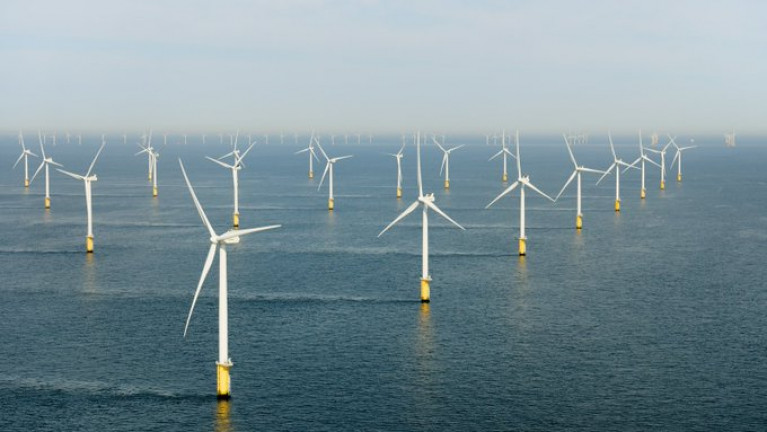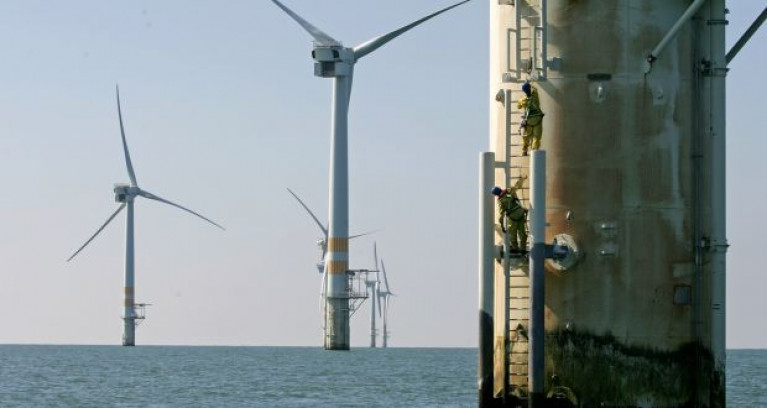Displaying items by tag: offshore wind farms
A series of Public Open Days, accompanied by meetings and panel discussions are underway in the Government’s consultation process about the four proposed Maritime Areas off the South Coast, within which fixed offshore wind farms may be located in the future. Analysis by Tom MacSweeney.
They began last night (Wednesday, May 17th) in Waterford. Today (Thurs), the venue is Cork County Hall on Carrigrohane Road, starting at 3 p.m. Next week, the consultation series moves to Wexford Town and then onto Rosslare Harbour, Kilmore Quay, Dunmore East, Ring, Tramore, Cobh and Ballycotton.
The decision of the Seafood Industry Representatives Forum (SIRF), a collective of eight Irish fishing and aquaculture industry representative organisations, to give a cautious welcome (they described it as ‘guarded’ in their official statement) to the Government’s ‘Future Framework Policy Statement for Offshore Renewable Energy’ is a significant development in the context of marine spatial planning.
This was followed by the transfer of responsibility for Ireland’s marine planning system to the Department of the Environment, Climate and Communications (DECC) from the Department of Housing, Local Government and Heritage.
"Is there a change of attitude at Government level, with more appreciation of the importance of the marine sphere to an island nation?"
The framework statement aligns ORE policy, including marine spatial planning, industrial strategy, interconnection, renewable hydrogen development, private wires, storage, infrastructural alignment and technology innovation
Questions have been raised about why marine planning had been given to the land-bound Housing Department, which has an unresolved major task of its own—housing Ireland’s population—while the Department of the Marine was ignored.
Is there a change of attitude at Government level, with more appreciation of the importance of the marine sphere to an island nation?
Minister Ryan is to publish Ireland’s first statutory Marine Planning Policy Statement and a ‘cross-section Marine Spatial Planning Advisory Group is being reactivated, according to his Department. Membership of this group will be important. It should not be solely composed of Departmental officials. Wide marine stakeholder representation is needed, but it is still only an ‘Advisory’ Group.
However, is it some response to the Seafood Forum’s request for “a working group comprising seafood industry representatives and officials of his Department to ‘knock heads together’ and find solutions to the problems that currently threaten the orderly roll out of offshore renewables,” as proposed by the Forum? Wind farm developers had a lead role in Phase One of offshore development to make site choices. The fishing industry has claimed those made will impact on traditional fishing grounds.
“Rather than portray fishermen as bad guys trying to prevent ORE, proper consideration should be given to the wider socio-economic and environmental priorities for local communities. This is the best way to help facilitate a stable political consensus and drive investment,” according to SIRF, which acknowledged that fishing, aquaculture and processing had been recognised as vital socio-economic activities and sources of income and employment for coastal communities in the ORE ‘Future Framework Policy Statement.’
It also recognised the potential socio-economic impacts of ORE on those communities. Wind energy developers have had a stronger public voice on policy up to now.
Is the Government's attitude moving towards a better appreciation of the need for balance and agreement among all stakeholders in the sector on marine planning and development?
There are other issues to be resolved - Marine Protected Areas, Designated Maritime Area Plans and Special Areas of Conservation. What impact will they have on marine leisure activities – boating, angling, sailing and the growing public interest in the marine sphere for recreation? These sectors are also stakeholders with requirements to be met as are NGO environmental organisations which has a strong voice on marine planning. All will have to accept that the best way forward is through general agreement.
The Department of the Environment, Climate and Communications has said that the new Marine Spatial Planning Advisory Group will “provide for alignment of marine policies and State investment in the maritime sector, giving leadership and oversight on a whole of Government basis.”
It is to be hoped that this will be delivered upon.
The Chairman of SIRC, the CEO of the Irish South and East Fish Producers’ Organisation, John Lynch, put it succinctly: “Future generations will not thank us if we do not get this right.”
A European election candidate and former Port of Cork chairman says plans at Rosslare and Cork Ports must be accelerated to enable the construction and maintenance of the offshore wind farms.
Former Bord Gais Éireann chief executive John Mullins, who is standing for Fine Gael in the European elections in the Ireland South constituency, made his comments after the Government published the location of four areas off the south coast were identified for offshore wind development in the State's Draft "DMAP" on Friday.
"I welcome the progress of the Designated Maritime Area Plan (DMAP) process. As part of this process, four sites have been chosen for wind farms: two off the Waterford coast and two off south Wexford", Mullins said.
"It is wonderful to see progress here as Ireland needs to advance in this area but it is vital that we get the accompanying grid plans from EirGrid and that new interconnections are considered," he added.
"Proper resources need to be put in place to enable the projects to get through foreshore and planning", he said
Mullins said it is important that this €1bn per annum opportunity sticks to the proposed timetable and that it is enabled by an all Government approach.
"Plans at Rosslare and Cork Ports must also be accelerated to enable the construction and maintenance of the offshore wind farms" he said.
He added, "We also need to ensure proper engagement with fishermen and other maritime interests so that these projects can be a success for all.
A Govenment maritime planning regime is being announced, which will enable the development of offshore wind farms.
Offshore wind farms are needed if Ireland is to achieve its climate targets and reduce dependence on imported gas and oil.
The Government has pointed to renewable energy as a way to increase energy security and its climate action plan set a target of at least 5GW of power from offshore wind farms by 2030 - greater than Ireland's current total wind capacity.
Those wind farms will need planning permission and the first phase of that will be to get a Marine Area Consent.
There are seven proposed wind farms with a combined capacity of around 3GW in the first batch to be considered. Six are off the east coast and one is off the coast of Conamara (Connemara).
Minister for the Environment, Climate and Communications Eamon Ryan will issue the consents, which are expected to happen in the second half of this year.
The Maritime Area Planning Agency (MARA) as Afloat reported last year, should be established by early next year when it will take responsibility for the area.
See also related launch of Maritime Planning Bill by the Taoiseach at Dun Laoghaire Harbour last year at the Irish Lights head quarters.
More available on the new agency from RTE News.
The headquarters for the new national maritime body, MARA, Afloat adds is to be based out of a new re-development at Trinity Wharf on Wexford's southern quays.
Offshore Wind Farm Public Consultation Extended
Public consultation on developing a network of offshore wind farms to meet Ireland’s climate targets has been extended by three weeks.
An original deadline of July 1st for the public’s views on how offshore wind energy should be modelled has now been set at July 22nd.
Coastal communities and the renewable energy sector had originally been given a short timeline to respond to a consultation paper on offshore wind farming published last month by outgoing Minister for Communications, Climate Action and Environment Richard Bruton.
The department – which is to be merged with Transport under new minister Eamon Ryan – has confirmed that submissions should be made via its original website address.
Under the Government’s Climate Action Plan, 70% of Ireland’s electricity will be generated from renewable energy by 2030.
The new Programme for Government increases a target of 3.5 gigawatts (GW) from offshore wind to five GW off the Irish east and south coasts by 2030.
It also commits to drawing up plans for draw up plans for exploiting the west coast renewable energy resource.
A consultancy report, published by Mr Bruton, outlines four options - ranging from a “developer-led” scenario, where each project would design its own connection to a more centralised “plan-led” offshore transmission development with more State involvement.
The consultation will inform a Government decision on the “appropriate offshore grid model for Ireland”, the department says.
The report by Navigant consultants from the Netherlands was commissioned for a working group involving Eirgrid, ESB Networks and the Commission for Regulation of Utilities. It examines how other European countries approach offshore grid planning and examines potential options that might be suitable for Ireland.
This model will be aligned with Ireland’s new National Marine Planning Framework, and the development consent regime for the maritime area as set out in the Maritime Planning and Development Management legislation.
More details on the consultation are here

























































